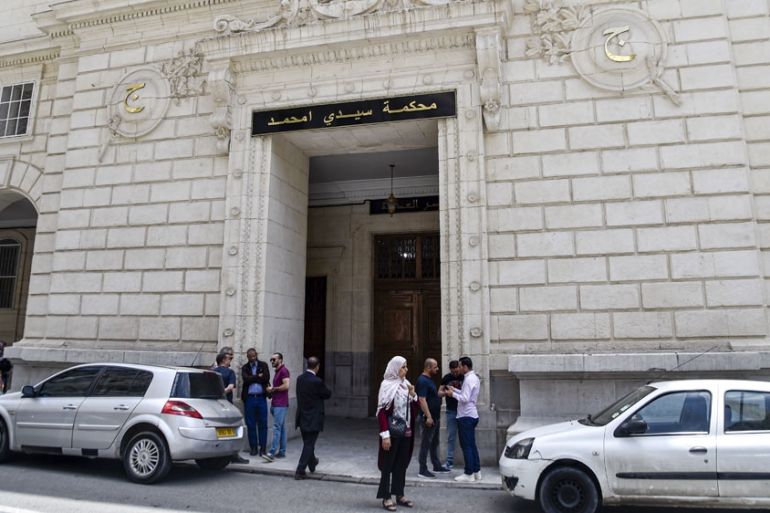Two former prime ministers go on trial for corruption in Algeria
Exceptional trial, which is being televised, comes at a time of renewed political tensions in the oil rich country.

Two former prime ministers in Algeria have gone on trial on corruption charges, in the most high-profile act of transparency and accountability since a pro-democracy movement pushed out the long-serving president.
The exceptional trial, which is being televised and also involves several other former Algerian power players, comes at a time of renewed political tensions in the oil and gas-rich country, a week in advance of a controversial election to replace President Abdelaziz Bouteflika.
Keep reading
list of 3 itemsAlgerian army chief: Won’t back any leader in presidential polls
Algeria: Bouteflika’s brother sentenced to 15 years in prison
Ahmed Ouyahia, who was forced out as prime minister in March as protests against Bouteflika escalated, and his predecessor Abdelmalek Sellal, testified Wednesday at the Sidi M’Hamed court in Algiers.
The accused face charges ranging from money laundering to abuse of office and granting undue privileges in the vehicle assembly industry.
Lawyer Mohamed Madjdoub, speaking on behalf of the defence, told the judge that “conditions … do not allow for lawyers to accomplish their mission and therefore, I inform you that the defence has decided to boycott the trial”.
The judge asked the lawyers to leave the small, crowded courtroom and said the proceedings would continue.
The nascent Algerian automotive sector got its start in 2014, via partnerships between foreign groups and large Algerian corporations, often owned by businessmen linked to Bouteflika’s entourage.
Setting a precedent
It is the first time since Algeria’s independence from France in 1962 that former prime ministers have been put on trial.
The two men argued that the court was not competent to try them, the constitution stipulating that crimes and infractions committed by prime ministers while in office fell under a “High Court of State”.
But the organic law to establish this court was not passed and the prosecutor responded that they had to answer for their actions before the ordinary court.
Called first to the stand, Ouyahia was accused of “misappropriation of public funds, abuse of office, granting undue privileges, conflict of interest, corruption, money laundering and false statements”.
He was charged with favouring certain manufacturers in the automotive sector – even if they did not fulfil brief specifications – to the detriment of competitors.
“There is no misappropriation (of public funds) and the choice … was based on the market. These manufacturers were already present and we wanted to keep them,” the former prime minister said in his defence.
Former ministers Bedda Mahdjoub (industry and mines), Youcef Yousfi, who succeeded him in the post, and Abdelghani Zaalane (public works and transport) are other defendants in the case.
Also standing trial was Ali Haddad, former head of the main Algerian employer organisation, the Forum of Business Leaders (FCE).
The 54-year-old businessman is also the founder and CEO of private construction firm ETRHB.
Among the other businessmen being tried is former FCE vice president Mohamed Bairi, CEO of the Ival group, which owns industrial vehicle plant Iveco.
Ahmed Mazouz, president of the eponymous group that assembles and distributes Chinese-brand vehicles in Algeria, and Hassane Arbaoui, head of Global Group which runs an Algerian factory for South Korean company Kia, are also defendants.
Key issue
Algerian authorities are hoping the trial helps convince the public that they are serious about fighting corruption and reforming themselves – and persuade them to go out and vote next week.
Corruption is a key issue for Algeria’s peaceful, 9-month-old protest movement, which considers the election a sham because it’s organised by the existing power structure. Protesters want a whole new political system instead.
“Only the people can judge whether we have the will to combat corruption,” Justice Minister Belkacem Zeghmati told legislator before the trial, describing the alleged corruption as “going beyond all comprehension.”
Bouteflika, whose health condition has remained a mystery since a 2013 stroke, has not been seen in public since he left power. Jeune Afrique magazine reported that he is staying in his home in Zeralda under full-time medical care.